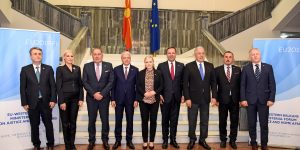On 7-8 December the EU-Western Balkans Justice and Home Affairs Ministerial forum took place in Sarajevo. On 8 December the Ministers of Justice discussed three important issues: the independence of the judiciary, the judicial cooperation in dealing with migration and the refugee crisis and tackling terrorism.
In the wake of the tragic events that took place on 13 November in Paris, Ministers of Justice discussed and agreed to work closely together to fight terrorism. It was agreed to step up co-operation with Eurojust in order to improve information exchange and so effectively pursue and bring to justice people involved in these activities. We discussed and agreed to address the financing sources of those engaged in terrorism. Cutting off the sources of financing of terrorists is a key element in fighting terrorism. This includes seizure and confiscation of assets. We made reference to the instruments of the Council of Europe, the standards of the Financial Action Task Force (FATF) and Moneyval’s recommendations which should be taken into account. UN Security Council resolutions in this field should be implemented. We discussed and agreed that we must not only focus on repressive measures, but also do everything we can in order to avoid people from radicalising. We discussed different ways of doing this and agreed to continue to exchange best practices. Local communities have a key role to play.
We also discussed the continuing migration and refugee crisis, agreed to fight human smuggling, and give special attention to the vulnerable persons among the refugees, especially the women and children.
We agreed on the importance of an independent judiciary as a fundamental element in ensuring the rule of law. The independence of the judiciary is also an integral component of the right to a fair trial and is key to create a relationship of trust towards other countries’ judicial systems and for judicial cooperation and applying mutual recognition instruments. The EU acknowledged the substantial efforts that had been accomplished in recent years but also underlined that effective implementation remains a key element for the Western Balkans on their way to EU accession. Ministers informed the EU of further progress made, and the EU expressed its willingness to support the countries justice reform processes, and work closely with them to bring the necessary reforms to a success.
Against this background the EU also offered the Western Balkans the opportunity to participate in its Justice and Rights, Equality and Citizenship Programmes which will strengthen the cooperation and exchange of experience between practitioners and facilitate participation in trainings.



